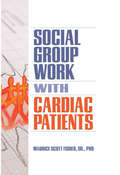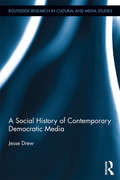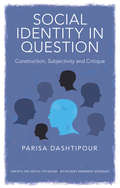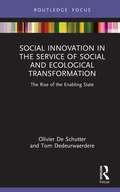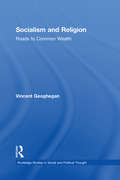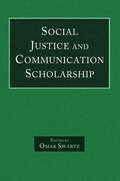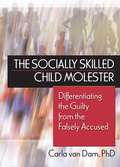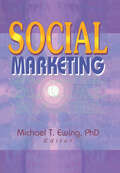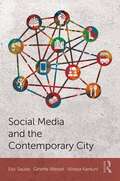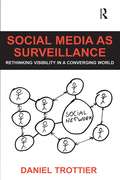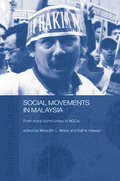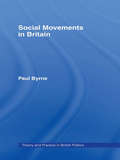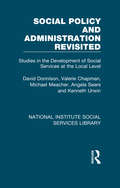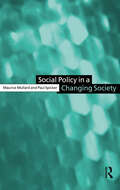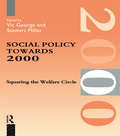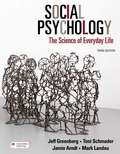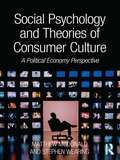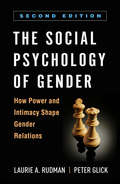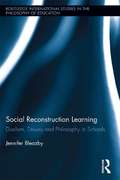Special Collections
Benetech’s Global Certified Accessible Titles
Description: Benetech’s GCA program is the first independent third-party EPUB certification to verify ebook accessibility. By creating content that is born accessible, publishers can meet the needs of all readers. Learn more: https://bornaccessible.benetech.org/
- Table View
- List View
Social Group Work with Cardiac Patients
by Maurice Scott FisherDevelop a comprehensive understanding of cardiac disease process Cardiovascular problems are on the rise in America. Care providers need to understand the overall clinical and statistical significance these life-changing events have to patients and families alike. Social Group Work with Cardiac Patients is a pragmatic guide that helps social workers and other psychosocial professionals develop and apply cardiac group work in a proactive and directed manner. This valuable text explores social group work with patients immediately recovering from a cardiac eventheart attack or failure, transplants, and implantable cardiac devicesas well the secondary effects of such events. Social Group Work with Cardiac Patients helps social work and healthcare professionals develop a comprehensive understanding of the psychosocial aspect of cardiac care. In addition to examining the correlation between cardiac disease and depression and anxiety, looking at the emotional aspects of heart disease, and providing an overview of social work group care, this unique text details the four core social groupscognitive-behavioral, psychoeducational, skill development, and interpersonal. Both fundamental and state-of-the-art, this comprehensive approach serves to enhance practice skills for immediate and constructive implementation. Important topics discussed in Social Group Work with Cardiac Patients also include: understanding adherence to cardiac health and psychosocial variables suggestions for using basic social groups and their development adherence issues associated with care stress management management of anger among patients holistic affects of cardiac disease on patients and families compliance, follow-up, and follow through substance abuse human sexuality differences between support groups and social group work models group leadership and co-leadership skills and many more! Social Group Work with Cardiac Patients is an asset as a pragmatic, relevant guide for development and actuation of both general social groups and specialty group treatment. An accessible and practical stand-alone text, Social Group Work with Cardiac Patients is ideal for mental health and substance abuse social workers, counselors, cardiac nurse specialists, cardiac treatment staff, and students of social work.
A Social History of Contemporary Democratic Media
by Jesse DrewThe last few decades have helped dispel the myth that media should remain driven by high-end professionals and market share. This book puts forward the concept of "communications from below" in contrast to the "globalization from above" that characterizes many new developments in international organization and media practices. By examining the social and technological roots that influence current media evolution, Drew allows readers to understand not only the Youtubes and Facebooks of today, but to anticipate the trajectory of the technologies to come. Beginning with a look at the inherent weaknesses of the U.S. broadcasting model of mass media, Drew outlines the early 1960s and 1970s experiments in grassroots media, where artists and activists began to re-engineer electronic technologies to target local communities and underserved audiences. From these local projects emerged national and international communications projects, creating production models, social networks and citizen expectations that would challenge traditional means of electronic media and cultural production. Drew’s perspective puts the social and cultural use of the user at the center, not the particular media form. Thus the structure of the book focuses on the local, the national, and the global desire for communications, regardless of the means.
Social Identity in Question
by Parisa DashtipourSocial identity theory is one of the most influential approaches to identity, group processes, intergroup relations and social change. This book draws on Lacanian psychoanalysis and Lacanian social theorists to investigate and rework the predominant concepts in the social identity framework. Social Identity in Question begins by reviewing the ways in which the social identity tradition has previously been critiqued by social psychologists who view human relations as conditioned by historical context, culture and language. The author offers an alternative perspective, based upon psychoanalytic notions of subjectivity. The chapters go on to develop these discussions, and they cover topics such as: self-categorisation theory group attachment and conformity the minimal group paradigm intergroup conflict, social change and resistance Each chapter seeks to disrupt the image of the subject as rational and unitary, and to question whether human relations are predictable. It is a book which will be of great interest to lecturers, researchers, and students in critical psychology, social psychology, social sciences and cultural studies.
Social Innovation in the Service of Social and Ecological Transformation
by Tom Dedeurwaerdere and Olivier De SchutterThis book explores how the State can play a role as an enabler of citizens-led social innovations, to accelerate the shift to sustainable and socially just lifestyles. To meet the twin challenges of environmental degradation and the rise of inequalities, societal transformation is urgent. Most theories of social change focus either on the role of the State, on the magic of the market, or on the power of technological innovation. This book explores instead how local communities, given the freedom to experiment, can design solutions that can have a transformative impact. Change cannot rely only on central ordering by government, nor on corporations suddenly acting as responsible citizens. Societal transformation, at the speed and scope required, also should be based on the reconstitution of social capital, and on new forms of democracy emerging from collective action at the local level. The State matters of course, for the provision of both public services and of social protection, and to discipline the market, but it should also act as an enabler of citizen-led experimentation, and it should set up an institutional apparatus to ensure that collective learning spreads across jurisdictions. Corporations themselves can ensure that society taps the full potential of citizens-led social innovations: they can put their know-how, their access to finance, and their control of logistical chains in the service of such innovations, rather than focusing on shaping consumers’ tastes or even adapting to consumers’ shifting expectations. With this aim in mind, this book provides empirical evidence of how social innovations, typically developed within "niches", initially at a relatively small scale, can have society-wide impacts. It also examines the nature of the activism deployed by social innovators, and the emergence of a "do-it-yourself" form of democracy. This book will appeal to all those interested in driving societal change and social innovation to ensure a sustainable and socially just future for all.
Socialism and Religion
by Vincent GeogheganIn the past decade philosophers and political theorists have increasingly pondered the role of religion in a modern secular society, and of the possible value of religion as a resource for contemporary thinking. The global resurgence of a new religious politics – graphically symbolised by 9/11 - has added a new urgency to this project; how is religion to be integrated, and if necessary contested, in such a time? As this study shows, the desire to integrate religion into a ‘progressive’ politics is not new. Providing a comprehensive analysis of the Common Wealth movement, this work seeks to bring together for the first time the religious and political commitments of four of the leading thinkers in the movement, bringing to light the significance of the relationships between them. This study examines at four interwar British radicals – the philosopher John Macmurray, the novelist and sexual theorist Kenneth Ingram, the Science Fiction writer Olaf Stapledon, and the Liberal M.P. Richard Acland – and examines their attempts to develop a socialism that whilst defending the achievements of the secular age was also sensitive to the virtues of religious traditions. Thus it considers Macmurray’s attempt to draw on the seemingly antagonistic traditions of Marxism and Christianity, Ingram’s long struggle to develop a Christian response to ‘deviant’ sexual behaviour, Stapledon’s exploration of a non-Christian religious spirit, and Acland’s journey from liberal atheist to Christian socialist. It then follows the activities of all four in the radical political movement founded by Acland in the midst of the Second World War, Common Wealth, particularly focusing on the positions they took in the serious battles over the function of religion that convulsed the leadership of this body. This work will be of great interest to scholars of political theory, religious studies, social and political thought.
Social Justice and Communication Scholarship
by Omar SwartzSocial Justice and Communication Scholarship explores the role of communication in framing and contributing to issues of social justice. This collection, a first on the subject of communication and social justice, investigates the theoretical and practical ways in which communication scholarship can enable inclusive and equitable communities within American society. It analyzes ways in which to construct communities that protect individual freedom while ensuring equality and dignity to everyone. In this unique anthology, Swartz brings together both senior scholars and junior colleagues to represent diverse applications of communication to issues of social justice. He supports partisan scholarship in order to revitalize intellectual activity and social commitment toward creating a progressive society. As a result; the volume serves the heuristic function of posing new research questions. In addition to its relevance within the field of communication, Social Justice and Communication Scholarship will be of interest in many of the humanities and social sciences, as research on the theme of social justice transcends disciplinary boundaries. The volume is particularly well suited for use in undergraduate and graduate courses in communication, rhetoric and composition, journalism, American studies, and cultural studies.
Social Justice and Third World Education
by Timothy J. ScraseFirst Published in 1997. Routledge is an imprint of Taylor & Francis, an informa company.
Social Literacies
by Brian V. StreetSocial Literacies develops new and critical approaches to the understanding of literacy in an international perspective. It represents part of the current trend towards a broader consideration of literacy as social practices, and as its title suggests, it focuses on the social nature of reading and writing and the multiple character of literacy practices.
The Socially Skilled Child Molester
by Carla Van DamKnow what signs indicate a child molester!Revealing the secret but successful strategies used by child molesters allows adults to intervene long before children are abused. The Socially Skilled Child Molester: Differentiating the Guilty from the Falsely Accused identifies how socially proficient molesters successfully ingratiate themselves into families and communities. The book closely examines their techniques and strategies while detailing the tools for prevention. The difficult issue of false accusation is tackled by learning the distinctions that clearly differentiate the actions of the guilty from those who are innocent. Practical recommendations for accurately assessing danger and managing safety are provided. The Socially Skilled Child Molester focuses on the sexual deviants who 'groom' family, friends, and their community to allow their activities, though arousing suspicion, to go on without restriction. This essential source reveals their tactics. Using composite representations of various types of child molesters, the author illustrates through case history and detailed research how these offenders succeed, while providing recommendations on how communities can stop enabling and protecting such individuals. The Socially Skilled Child Molester discusses in depth: ’groomers’ versus ’grabbers’ common misperceptions about child molesters the groomer profile—the different types groomer strategies for manipulation correctly differentiating between pedophiles and the falsely accused predicting risk the key concerns when interviewing child molesters the three levels of child molesters recidivism for the sexual deviant. The Socially Skilled Child Molester comprehensively brings together helpful strategies and vital information essential for parents, lawmakers, police, teachers, and therapists.
Social Marketing
by Michael T. EwingHarness commercial marketing techniques to spark social change!American Express, Avon, BMW, Kellogg’s, Liz Claiborne, McDonald’s, Reebok, and other corporations have embraced social and cause-related marketing as a way to connect with their customers. This vital book examines the “how and why” as well as the causes and effects of this fast-growing trend in marketing. Social Marketing brings you: an overview of recent global developments in social marketing a study comparing the effectiveness of a CRM program with that of “ambush” advertising a case study of Hungersite.com that investigates motivations for donating time, money, and other resources to charities a wary look at the “darker side” of globalization and liberalization and more!
Social Media and the Contemporary City
by Eric Sauda and Ginette Wessel and Alireza KarduniThe widespread adoption of smartphones has led to an explosion of mobile social media data, more than a billion messages per day that continuously track location, content, and time. Social Media in the Contemporary City focuses on the effects of social media on local communities and urban space in a variety of political and economic settings related to social activism, informal economic activity, public art, and global extremism. The book covers events ranging from Banksy art installations, mobile food trucks, and underground restaurants, to a Black Lives Matter protest, the Christchurch mosque shootings, and the Pulse nightclub shooting. The interplay between urban space, local community, and social media in each case study requires diverse methodologies that are both computational (i.e. machine learning, social network analysis, and natural language processing) and ethnographic (i.e. semi-structured interviews, thematic analysis, and site analysis). The book views social media not as a replacement for the local community or urban space but rather as a translation of the uses and meanings of all three realms. The book will be of interest to students, researchers, and instructors in a number of disciplines including urban design/planning, media studies, geography, and communications.
Social Media as Surveillance
by Daniel TrottierWhile there is a lot of popular and academic interest in social media, this is the first academic work which addresses its growing presence in the surveillance of everyday life. Some scholars have considered its impact on privacy, but these efforts overlook the broader risks for users. Commonsense recommendations of care and vigilance are not enough, as attempts to manage an individual presence are complicated by the features which make social media 'social'. Facebook friends routinely expose each other, and this information leaks from one context to another. This book develops a surveillance studies approach to social media by presenting first hand ethnographic research with a variety of personal and professional social media users. Using Facebook as a case-study, it describes growing monitoring practices that involve social media. What makes this study unique is that it not only considers social media surveillance as multi-purpose, but also shows how these different purposes augment one another, leading to a rapid spread of surveillance and visibility. Individual, institutional, market-based, security and intelligence forms of surveillance therefore co-exist with each other on the same site. Not only are they drawing from the same interface and information, but these practices also augment each other. This groundbreaking research considers the rapid growth and volatility of social media technology by treating these aspects as central to social media surveillance.
Social Media Marketing for Business
by Andrew JenkinsSocial media has become an imperative for almost every business. Discover how to successfully implement an effective social media strategy that is supported and integrated throughout every part of your organization, with this essential handbook to enhancing your online presence. Social Media Marketing for Business provides a step-by-step roadmap to setting up effective workflows, team configurations, governance models and social media policies, alongside creating and measuring content and social media campaigns that have the competitive edge. Featuring insights from leading industry experts, it covers areas such as balancing social media ownership, measuring success using analytics and conducting a social media audit. Containing an array of international case study examples from organizations such as The World Wildlife Fund (WWF), Deloitte Digital, Dell, Burger King and LVMH, Social Media Marketing for Business explores how to build a supportive culture, get buy-in and the common pitfalls to avoid. Supported by a content calendar templates, content marketing framework and online presentation slides, this book is a one-stop-shop for developing effective social media marketing strategies and integrating them within your business.
Social Mobilization in the Arab/Israeli War of 1948
by Moshe NaorIn many ways, the Arab-Israeli war of 1948 is typical of the total military conflicts that characterized the first half of the twentieth century. However, in addition to the military course of the war, and its formative and revolutionary ramifications, this war was also notable for the social mobilization of the Israeli population. Social Mobilization in the Arab-Israeli War of 1948 focuses on these civilian aspects of the war, the involvement of the Israeli home front in the fighting and the participation of society in the process of mobilization. Israeli civil society organizations played an active and central role in mobilizing the economy for the war effort, mobilizing personnel for military service, for labor and for the emergency services, and in organizing the home front. The function of Israeli society and civil organizations in processes of mobilization, conducted against the background of the end of the British mandate and the establishment of the State of Israel, was one of the principal factors that contributed to the Israeli military victory in the 1948 war. Civilian aspects of the 1948 war have received little attention, despite the opening of the archives in the 1980s. As such, Social Mobilization in the Arab-Israeli War of 1948 is an important contribution, particularly for those interested in Israeli History, Jewish History, Middle Eastern History, the Arab-Israeli conflict and War Studies.
Social Movement Malaysia
by Meredith L. Weiss and Saliha HassanThis book considers the proliferation in Malaysia over the past two decades of non-governmental organizations (NGOs) associated with various social movements, both to provide basic information about the NGOs and social movements, and to discuss their role in the development of civil society generally in particular their contribution to the reform movement, which has been gathering strength since 1998. The book discusses the nature and development of the movements, and shows that those movements concerned with human rights and women's issues have made significant contributions to the reform movement and been irrevocably changed by their involvement in it.
Social Movements in Britain
by Paul ByrneSocial Movements have become a central focus of political study in recent years. Paul Byrne's accessible account of British Social movements introduces students to the relevant theories, and puts them into practice by examining groups such as Greenpeace, Friends of the Earth, the Women's Movement and the Green Party. Byrne goes on to look at how the British scene compares with what is happening in the rest of Europe and in America.
Social Policy and Administration Revisited
by David Donnison and Michael Meacher and Valerie Chapman and Angela Sears and Kenneth UrwinOriginally published in 1965, this standard work sets out to explore the questions: What is ‘social administration’, and how can people prepare themselves for this work? It shows the social services in continuous evolution in response to political, economic and social change, and it ends with a deeply thoughtful and thought-provoking analysis of the processes and causes of this evolution, and of the different contributions to change made by the various parties concerned. This analysis is based on the case studies presented in the book’s central chapters. Of this new version of the book, first published in 1975, Professor Donnison wrote: ‘The first three chapters of the original book have been scrapped and a new introduction to the whole subject takes their place – an introduction not only to the literature about social policy and administration but to the "point" and purpose of the subject (for students who, rightly, expect to be convinced about this before devoting their time to it). Then follow eight case studies of innovations in the work and policies of local units of the social services – including housing, education, a home help service, planning and legal aid, besides social work services. These are the original studies untouched. I have returned to each agency and found out what has happened since our original studies, adding a postscript to each, outlining the main developments since the original research, ten to twenty years ago. I don’t think anyone has ever done that before. In most cases the innovating trends we identified have gone further, often becoming national orthodoxy by now. The one (on legal aid) where unexpected developments have occurred is at least as interesting.’ Professor Donnison has added a ninth case study – of the Department of Social Administration at the London School of Economics where he was working when the original studies were made (Professor Richard Titmuss was head of the department at that time). This study traces the development of education for social workers at a seminal stage and the difficult problems which had to be resolved when major new departures occurred in this field. The chapter will be of lasting interest to historians of social work and social work education in Britain, besides throwing light on the process of innovation in social policy.
Social Policy in a Changing Society
by Paul Spicker and Maurice MullardSocial Policy in a Changing Society is a critical guide to theories about society, exploring the links between social theory and social policy. It considers a range of interpretations of changes in society, politics and the economy, and assesses their practical implications for social welfare. Social Policy in a Changing Society will be essential reading for undergraduates studying social policy and sociology.
Social Policy Towards 2000
by Vic George and Prof Vic George and Stewart MillerGovernments in all advanced industrial societies are involved in an endless struggle of how to 'square the welfare circle', as demand for public services rises due to demographic, social and labour market foctors. Government ability to finance this rising tide of public service demand is constrained by economic and, at times, ideological factors but failure to make welfare provision has adverse electoral consequeces. This is not an issue which is likely to go away. Social Policy Towards 2000 examines the issues and factors affecting the welfare state and by comparing the proposals of the three main UK political parties for the welfare system for the remaining part of the decade, offers a prospective analysis of the future of welfare.
Social Psychology
by Jeff Greenberg and Toni Schmader and Jamie Arndt and Mark LandauWith Macmillan’s superior content delivered by LaunchPad, Social Psychology offers a fresh approach to the study of social psychology, that no other available text can match. The authors draw on over 50 years of combined teaching and research to guide students through the rich diversity of the science of social psychology, weaving together explanations of theory, research methods, empirical findings, and applications to show how social psychologists work to understand and solve real-world problems. The new edition’s LaunchPad brings together all student and instructor resources, including an interactive e-book, LearningCurve adaptive quizzing, Video Activities, The Science of Everyday Life Experiments and Activities, and more.
Social Psychology and Theories of Consumer Culture
by Stephen Wearing and Matthew McDonaldSocial Psychology and Theories of Consumer Culture: A Political Economy Perspective presents a critical analysis of the leading positions in social psychology from the perspective of classical and contemporary theories of consumer culture. The analysis seeks to expand social psychological theory by focusing on the interface between modern western culture (consumer culture) and social behaviour. McDonald and Wearing argue that if social psychology is to play a meaningful role in solving some of society’s most pressing problems (e.g. global warming, obesity, addiction, alienation, and exclusion) then it needs to incorporate a more comprehensive understanding and analysis of consumer culture. Wide-ranging and challenging, the book offers a fresh insight into critical social psychology appropriate for upper undergraduate and postgraduate courses in personality, social psychology, critical and applied psychology. It will also appeal to those working in clinical, counselling, abnormal, and environmental psychology and anyone with an interest in the integration of social psychology and theories of consumer culture.
The Social Psychology of Gender, Second Edition
by Peter Glick and Laurie A. RudmanNoted for its accessibility, this text--now revised and updated to reflect a decade of advances in the field--examines how attitudes and beliefs about gender profoundly shape all aspects of daily life. From the schoolyard to the workplace to dating, sex, and marriage, men and women alike are pressured to conform to gender roles that limit their choices and impede equality. The text uses real-world examples to explore such compelling questions as where masculine and feminine stereotypes come from, the often hidden ways in which male dominance is maintained, and how challenging conventional romantic ideals can strengthen heterosexual relationships. New to This Edition *Chapter on the sexualization of women's bodies, and resistance to it (including #MeToo). *Chapter on the harmful effects of "real man" ideology. *Numerous new examples drawn from current events. *Updated throughout with the latest theories, research, and findings.
Social Rage
by Bonnie BerryThis book defines and describes the meaning of social rage by examining the influence of social forces such as economic conditions, population diversity and power shifts. The role of media, in particular its encouragement of social rage through sensationalism, is also handled in this book. The author apporaches the issue of social rage on both an individual and a collective level with the goal of revealing its motivations and its impact.
Social Reality
by Finn CollinSocial reality is currently a hotly debated topic not only in social science, but also in philosophy and the other humanities. Finn Collin, in this concise guide, asks if social reality is created by the way social agents conceive of it? Is there a difference between the kind of existence attributed to social and to physical facts - do physical facts enjoy a more independent existence? To what extent is social reality a matter of social convention. Finn Collin considers a number of traditional doctrines which support the constructivist position that social reality is generated by our 'interpretation' of it. He also examines the way social facts are contingent upon the meaning invested in them by social agents; the nature of social convention; the status of social facts as symbolic; the ways in which socially shared language is claimed to generate the reality described, as well as the limitations of some of the over-ambitious popular arguments for social constructivism.
Social Reconstruction Learning
by Jennifer BleazbyThis volume argues that educational problems have their basis in an ideology of binary opposites often referred to as dualism, which is deeply embedded in all aspects of Western society and philosophy, and that it is partly because mainstream schooling incorporates dualism that it is unable to facilitate the thinking skills, dispositions and understandings necessary for autonomy, democratic citizenship and leading a meaningful life. Drawing on the philosophy of John Dewey, feminist pragmatism, Matthew Lipman’s Philosophy for Children program, and the service learning movement, Bleazby proposes an approach to schooling termed "social reconstruction learning," in which students engage in philosophical inquiries with members of their community in order to reconstruct real social problems, arguing that this pedagogy can better facilitate independent thinking, imaginativeness, emotional intelligence, autonomy, and active citizenship.
